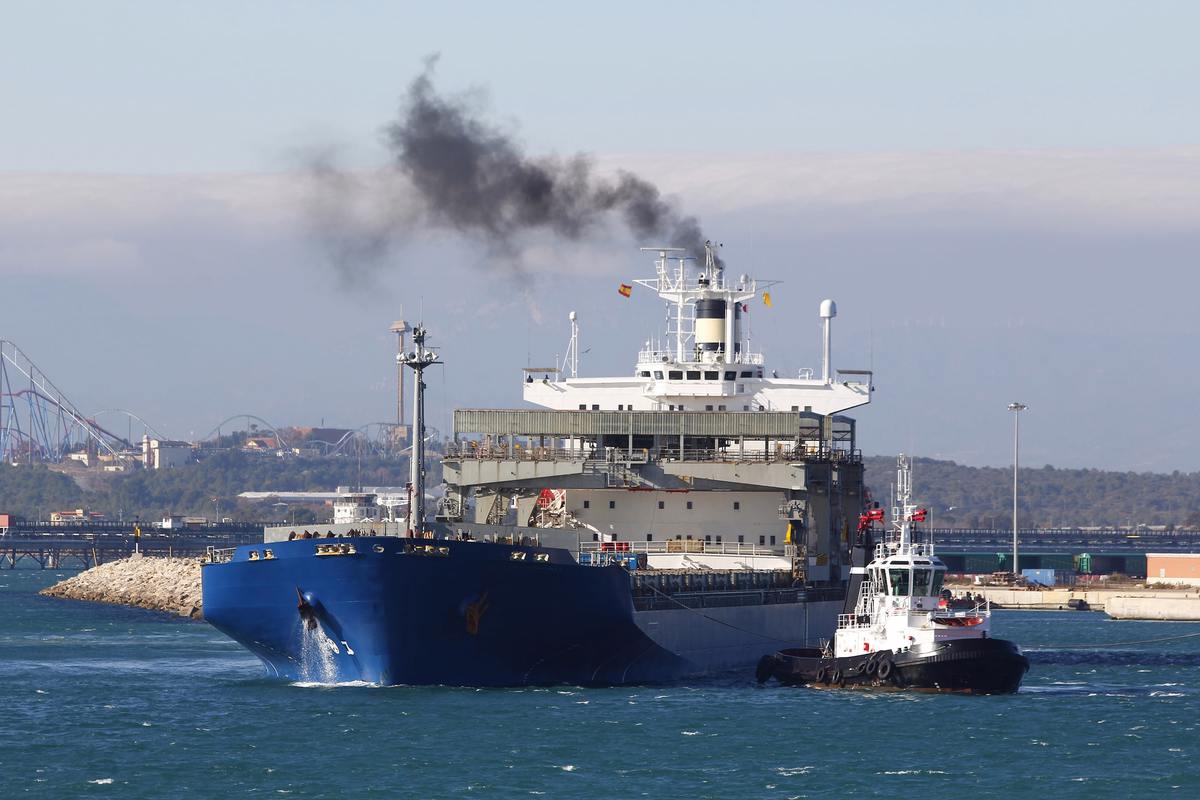‘Implementation’ must be the key word at COP28 – DNV
Policy implementation should take precedence at COP28 this month, said Ditlev Engel, chief executive of energy systems at DNV.
 PHOTO: Exhaust emissions from a vessel. Getty Images
PHOTO: Exhaust emissions from a vessel. Getty Images
“Science tells us that we must achieve a net-zero energy system by 2050 to limit global warming to 1.5 degrees. With emissions at record levels and set to climb higher before peaking next year, the chances of hitting that target are now, admittedly, remote – but not impossible,” Remi Eriksen, chief executive of DNV wrote in the classification society’s latest pathway to net zero emissions report.
Global greenhouse gas emissions must be cut by 8% every year by 2050 to meet this target, according to a webinar by DNV. It is 2% more than the 6% drop in global emissions during the Covid-induced lockdowns. The key to accelerating this transition and meeting the climate goals is swift policy implementation, Engel noted.
Lack of execution is a major hurdle for green transition, says DNV
Last year’s COP27 climate summit set the stage for ambitious global action to combat climate change.
It saw commitments from countries to work towards accelerating the phase-out of inefficient fossil fuel subsidies and unabated coal use. It also saw the creation of a climate-focused loss-and-damage fund. The fund set a goal of $100 billion/year for climate financing to assist developing and climate-vulnerable countries in achieving their climate goals.
However, the fund has not been mobilised nor have efforts been intensified to eliminate coal use. In fact, a recent report by the UN Environment Programme (UNEP) found that “governments plan to produce around 110% more fossil fuels in 2030 than would be consistent with limiting warming to 1.5°C.” The report was co-authored by climate-focused think tanks International Institute for Sustainable Development (IISD) and E3G and non-profit Climate Analytics.
“When combined, government plans would lead to an increase in global coal production until 2030, and in global oil and gas production until at least 2050, creating an ever-widening fossil fuel production gap over time,” the UN report revealed.
This procrastination must end at COP28 this month, DNV’s director of energy transition outlook, Sverre Alvik argued. Green transition needs to be twice as fast globally to limit global warming below 1.5°C. Therefore, governments must finally walk the talk and expedite policy rollout.
This year, the EU is leading the call for an end to fossil fuel subsidies, and unabated fossil fuel use and launching a global carbon tax. The private sector is also throwing its weight behind the end of fossil fuels by 2050. 131 companies with nearly $1 trillion/year in combined revenues have urged COP28 participants to phase out fossil fuels by 2050. They have also urged them to boost efforts to drive up demand for alternative fuels.
Amid global efforts to reduce fossil fuel consumption, the shipping industry faces severe challenges due to its heavy reliance on fossil-based marine fuels. However, policy measures to decarbonise the maritime industry have been progressing at a slow pace.
Slow implementation of global maritime policies stifling green shipping transition?
“The energy transition in shipping will require major investment in infrastructure and production capacity for supply of carbon-neutral fuels,” the report said. Engel, however, noted that investors and suppliers will need a long-term commitment from demand offtakers - at least beyond 2035 - if they intend to scale up the infrastructure and production of net-zero fuels and technologies.
According to him, a long-term commitment can only be fostered through "regulatory guarantees and financial incentives". This will help the shipping sector achieve its mandatory emission-reduction goals and steer investments toward increasing fuel and technology production.
The shipping sector's fuel mix will primarily consist of oil and natural gas in 2035, with electricity and biofuels contributing to achieving net-zero emissions by 2050, the DNV report estimates.
By 2050, DNV predicts that the marine fuel mix will be dominated by green fuels, especially ammonia and synthetic or e-fuels. In DNV's pathway to net-zero emissions, natural gas, biofuels, and electricity will account for a small share, while fossil fuels must be completely phased out.
The report recommended some measures for accelerating green fuel adoption on ships. This includes "mandated uptake of green fuels, technical or operational requirements on GHG emissions and carbon pricing that ensures a level playing field for ships running on more expensive carbon-neutral fuels."
“A clear, long-term, and predictable regulatory framework for [maritime] emission reductions will be the key driver for technology development and investing in deploying carbon-neutral fuels and solutions. Initial policies need to focus on lowering critical barriers such as the cost differential between new and conventional fuels,” the report concluded.
By Konica Bhatt
Please get in touch with comments or additional info to news@engine.online






